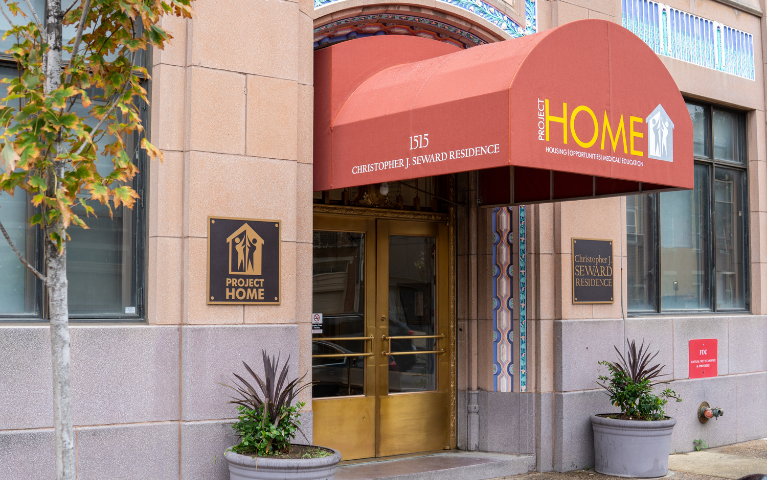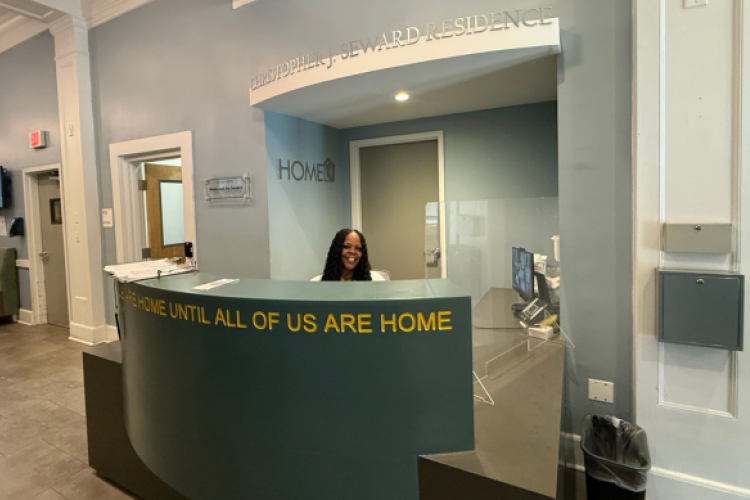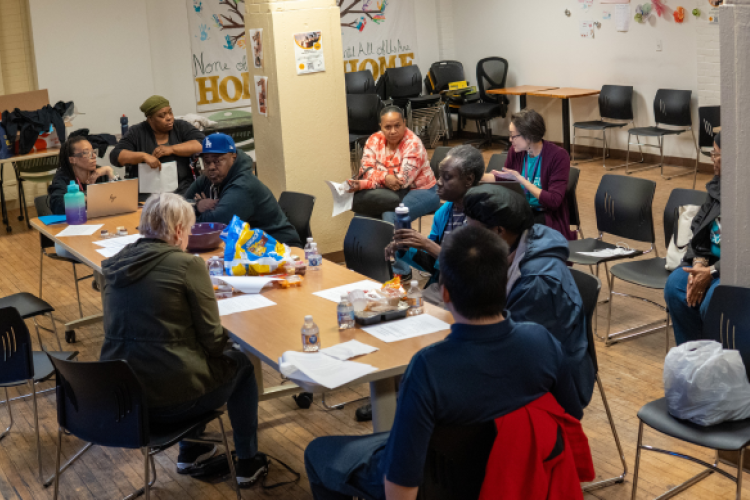Christopher J. Seward Residence

There is no building in the Project HOME community more iconic than the historic landmark at 1515 Fairmount Avenue. It had a dramatic start in the 1990’s when, after four years of litigation, Project HOME won the right to provide housing at 1515— a legal decision that impacted fair housing throughout the country. Since then, it has been a strategic outpost - housing multiple programs including 24/7 street Outreach for the city of Philadelphia, 48 homes for individuals who experienced homelessness, Project HOME social enterprise businesses, and leadership offices. Perhaps most importantly, the big room known as the “back space” has been a place where the Project HOME community has gathered —before overnight Point in Time counts, or for gatherings called Potlatches; weekly for our Inspiration meetings; and daily for shared lunches, candle-making, and space to support our shared journeys HOME.
Now, after 30 years, this beloved epicenter of the Project HOME family is receiving a name for the first time. In recognition of our generous partners, Marie and Jim Seward, 1515 Fairmount Avenue will now be called Christopher J. Seward Residence. Marie and Jim and their family have been connected to Project HOME for many years as Outreach volunteers supporting showers, meals, and connection to services for individuals experiencing homelessness, and as generous donors, becoming MPOWER partners in 2019.
About Christopher J. Seward
In memory of their son, Christopher, whom they lost in 1999, Christopher J. Seward Residence will continue to have its doors open to those who are looking for a safe place to call home. As a sign reads in the entrance vestibule, “Chris was touched by the plight of people experiencing homelessness. To all who knew him, humanity and care for others was part of who he was and how he lived. In his memory and spirit, Chris’ family bears witness to his desire to help those who are homeless or struggling by partnering with Project HOME to break the cycle of homelessness.”
Additional Information
Continuum of Care | Permanent Supportive Housing
Single Room Occupancy (SRO) | 48 fully-furnished affordable units in apartment-style clusters (24 units dedicated for chronically homeless)
- Documented current homelessness
- Documented current disability of serious mental illness
- Must be over age 18
- Demonstrated the ability to live independently, including monitoring medications; managing finances; cooking and cleaning; managing transportation; and other independent living skills
- On-site laundry
- 24-hour reception
- Fitness room
- Computer kiosks
- On-site Double Trouble meetings
- Small garden with seating and tables
Referrals for Project HOME PSH housing within the Philadelphia Continuum of Care (CoC) are made via the Philadelphia Coordinated Entry and Assessment-Based Housing Referral System (CEA-BHRS).
Single Room Occupancy (SRO) | 48 fully-furnished affordable units in apartment-style clusters (24 units dedicated for chronically homeless)
- 30 percent of Income
None of us are home until all of us are home, and at Project HOME this means that we can all have a decent standard of living today without compromising our needs in the future. When thinking about the footprints – the waste, the greenhouse gases, the toxins – we leave behind through our daily living, we must recognize that the earth is our home.
This is why Project HOME has made sustainability a priority for current and future developments. Sustainability is based on a simple principle: everything that we need for our survival and well-being depends, either directly or indirectly, on our natural environment. Thus, our goal is to ensure that all developments reflect the shared values of economic, social, and environmental sustainability by:
- Decreasing energy usage
- Constructing all new buildings to meet Leadership in Energy & Environmental Design (LEED) certification guidelines
- Reducing fuel use of Project HOME vehicles
- Procuring more sustainable products
- Reducing waste
- Engaging Project HOME community members in sustainability efforts
- Supporting neighborhood sustainability
- Increasing access to healthy foods for residents and community members
Guided by these principles, we’ve taken sustainability from offices to residences, and even to gardens to promote energy and waste reduction, environmental education and justice, and health and wellness for all.


